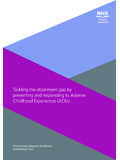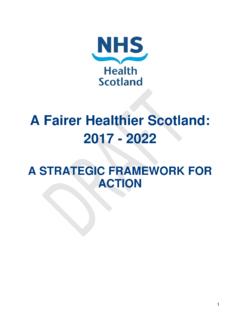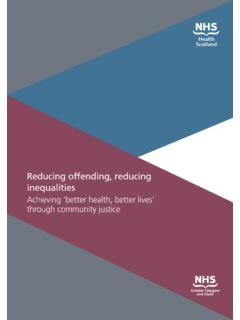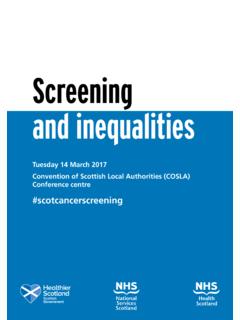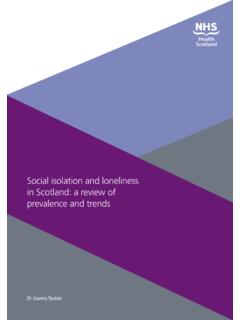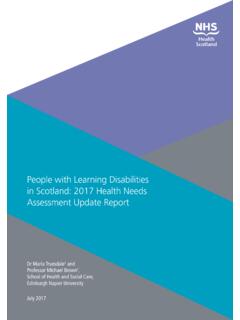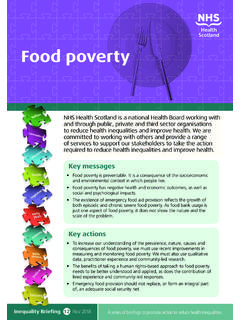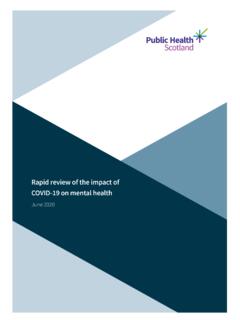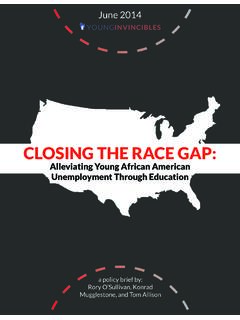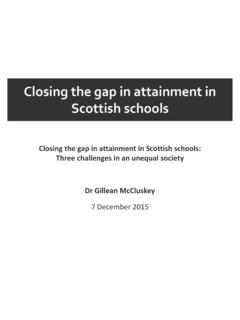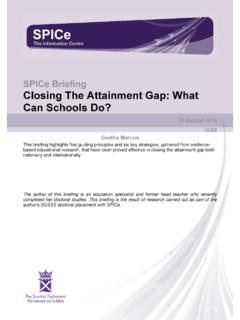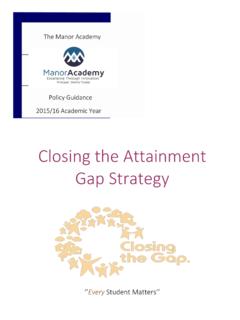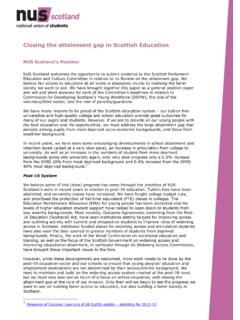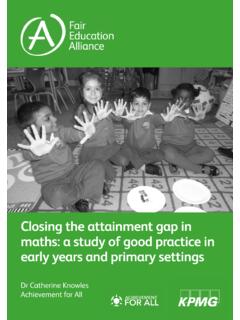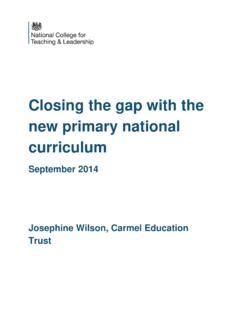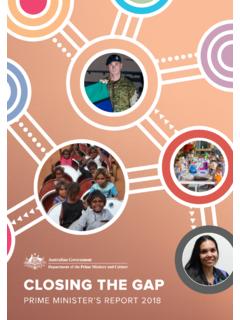Transcription of Rapid Evidence Review: Reducing the attainment gap – the ...
1 Rapid Evidence Review: Reducing the attainment gap the role of health and wellbeing interventions in schools. Dr Jane WhitePublished by NHS Health Scotland1 South Gyle CrescentEdinburgh EH12 9EB NHS Health Scotland 2017 All rights reserved. Material contained in this publication may not be reproduced in whole or part without prior permission of NHS Health Scotland (or other copyright owners).While every effort is made to ensure that the information given here is accurate, no legal responsibility is accepted for any errors, omissions or misleading Health Scotland is a WHO Collaborating Centre for Health Promotion and Public Health resource may also be made available on request in the following formats: 0131 314 5300 Dr Jane White, Evidence for Action Team, NHS Health ScotlandCitation: This paper should be cited as White, J.
2 Rapid Evidence Review: Reducing the attainment gap the role of health and wellbeing interventions in schools. Edinburgh: NHS Health Scotland; further information about this publication please contact: Dr Jane White Email: Contents Introduction .. 2 Key messages .. 2 1. Background .. 3 2. Social and emotional wellbeing .. 5 3. Promoting healthy lifestyles .. 15 4. Discussion .. 24 5. Conclusion .. 26 Appendix 1: Method .. 27 Appendix 2: Eligibility criteria for free school meals .. 30 References .. 31 2 Introduction The purpose of this review is to examine the effectiveness of health and wellbeing interventions in a school setting to potentially reduce inequalities in educational outcomes.
3 It begins by giving a brief description of the inequalities in educational outcomes in Scotland along with the political context for this paper. The next section focuses on social and emotional wellbeing interventions and the links with educational and wellbeing outcomes. The following section looks at interventions that promote healthy lifestyles and their potential impact on wellbeing and attainment . The final section discusses the findings of the previous sections. The method used to identify papers for this review is detailed in Appendix 1.
4 The review was restricted to research conducted in the United Kingdom (UK) and Ireland to ensure that findings were as relevant to the Scottish education system as possible. As children who have higher social and emotional wellbeing tend to do better in school,1 studies that reported wellbeing outcomes were included. The review is intended as a source of information for people working in primary and secondary education, providing an overview of the supporting Evidence for specific health and wellbeing programmes.
5 NHS Health Scotland does not endorse the use of any programme over another. Decisions to use a particular programme should take into account the effectiveness of the programme and the local delivery context. Local considerations may include cost, need, resources and workforce implications (including ongoing training and supervision). Key messages Consistent international review-level Evidence suggests that universal social and emotional learning programmes can have positive impacts on wellbeing and educational outcomes.
6 However, findings from studies conducted in the UK and Ireland were mixed. The quality of implementation of social and emotional learning programmes was important for positive outcomes. Programmes that fit the needs and context of the class or school and are easy to carry out are more likely to be implemented well. Few studies conducted in the UK and Ireland reported the effect on children and young people from different socio-economic or ethnic backgrounds. 3 Offering healthy, nutritious lunches at school tended to have beneficial effects on educational outcomes.
7 There was inconsistent Evidence that breakfast clubs, where children were provided with a nutritious breakfast at school, have an impact on educational outcomes. A number of promising approaches merit further examination. 1. Background In general, children from poorer families have poorer educational outcomes compared to those from more affluent 3 4 While these associations are not unique to the UK, differences in Scotland are marked, starting before children begin school and persisting For example, in the latest Scottish Survey of Literacy and Numeracy.
8 The proportion of Primary 4 children who were assessed as doing well or very well in reading ranged from 67% in the most deprived areas to 85% in the least deprived (Figure 1). Similar patterns were seen for writing, listening and talking5 and numeracy6. Figure 1: Proportion of pupils performing well or very well in reading by stage and deprivation category5 4 The Scottish attainment Challenge aims to achieve equity in educational outcomes, with a particular focus on closing the poverty-related attainment gap.
9 The Scottish Government has committed 750 million over the course of the current parliament (2016 2021) to close the poverty-related attainment gap for pupils from the most deprived areas. This includes 120 million of Pupil Equity Funding which benefits every council area in Scotland and is allocated directly to Allocations are based on the number of pupils from P1 to S3 who are eligible and registered for free school meals (see Appendix 2), with schools receiving around 1,200 per Education Scotland has developed a framework of Interventions for equity to help guide the decisions of school leaders (Figure 2).
10 9 In order to support the development of Evidence -informed programmes within this framework, NHS Health Scotland was asked to identify and review health and wellbeing interventions in a school setting that could contribute to Reducing inequalities in educational outcomes. Figure 2: Interventions for equity framework9 5 2. Social and emotional wellbeing Healthy social and emotional development in childhood and adolescence has been shown to be positively associated with better educational outcomes and greater Children and young people from disadvantaged backgrounds are at increased risk of poor social and emotional 10 It is not, however, inevitable.
